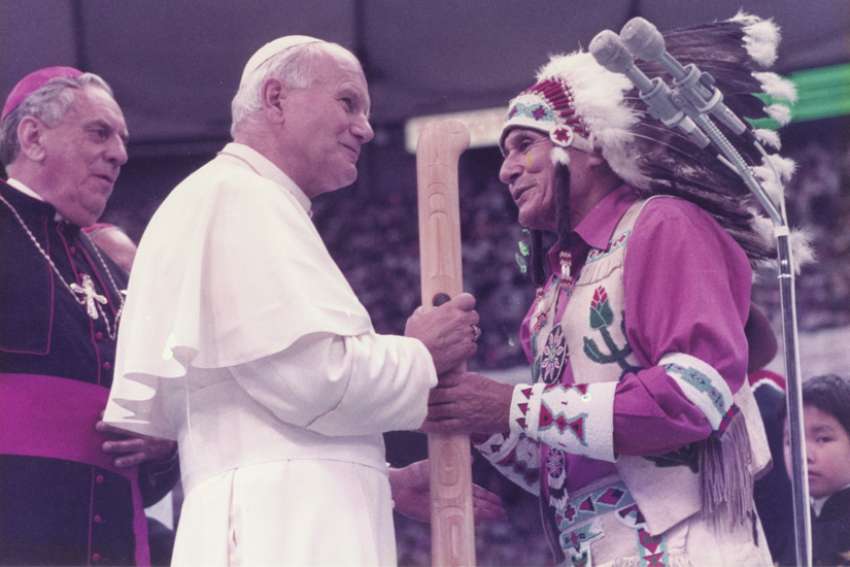Both Sacred Heart Church and St. Gregory’s Church serve Indigenous communities, the former on Penticton Indian Band land and the latter on Osoyoos Indian Band land, both in the Diocese of Nelson, B.C. At press time neither suspects nor a motivation had been established.
Yet given the occasion of National Indigenous Peoples Day and the recent tension and anger after the Kamloops discovery of unmarked graves, it would be a surprise if the two were not related. The pastor of Sacred Heart, Fr. Obi Ibekwe, had actively acknowledged the pain and suffering in his community and had led a candlelight vigil for the Kamloops children in consultation with local Indigenous leaders.
The burning of a church is an act of grave sacrilege as well as a crime against the parishioners of Sacred Heart and St. Gregory’s. Sin begets sin, suffering begets suffering.
In the secular news, the residential schools issue is portrayed as an issue between Indigenous Canadians and the churches, particularly the Catholic Church.
But it is an issue within the household of faith, for the majority of Indigenous Canadians are Christians, a great many Catholic. It was our fellow Catholics who had their churches set ablaze, just as many of the children in the residential schools came from Catholic families. Those Catholic parents trusted that the religious orders who operated the schools would look after their children.
Catholic-Indigenous relations, both within and without the Church, are particularly raw at the moment. Indeed, the sad truth is that reconciliation — a long and sometimes painful task — has been set back in the years since the Truth and Reconciliation Commission reported in 2015. The TRC called for the government and the churches to move from “apology to action.” On the Catholic front, it has too often been from apology to friction.
Many commentators — some sympathetic to the Catholic Church, others hostile — think that the way forward is for Catholic leaders to issue more apologies. It may indeed advance the missions of healing and evangelization. There can be little objection to doing again what has already been done before.
Indeed, in the preparation for the Great Jubilee of 2000, St. John Paul II deepened the Church’s theology of apology in his desire to advance the “healing of memories.” An unintended consequence of that important step is that apologies have become somewhat routine.
A complement to the path of contrition is the path of renewed encounter. Encounter is a complex reality, including both the evangelical desire which motivated St. Ignatius to send out missionaries far from Rome, and the invitation to human fraternity that Pope Francis proclaimed anew last year.
The most memorable Catholic Indigenous encounter in Canada took place in remote Fort Simpson in 1987. During his 1984 visit to Canada, St. John Paul II intended to visit the tiny Aboriginal community of 1,200 as an act of respect and solidarity with the Indigenous communities of the north. Fog prevented his plane from landing, but the Holy Father promised that he would return.
Many promises made to the Indigenous peoples have been broken. But John Paul kept his word, and he flew to Fort Simpson in 1987 after a visit to the United States. It was an encounter of great emotion, with John Paul celebrating the Holy Mass under the timbers of an enormous teepee.
“My coming among you looks back to your past in order to proclaim your dignity and support your destiny,” John Paul said at Fort Simpson. “Today I repeat those words to you, and to all the Aboriginal peoples of Canada and of the world. The Church extols the equal human dignity of all peoples and defends their right to uphold their own cultural character with its distinct traditions and customs.
“Once again I affirm the right to a just and equitable measure of self-government, along with a land base and adequate resources necessary for developing a viable economy for present and future generations,” he added.
Fully aware of the lights and shadows in the long history of encounter, John Paul recalled that “at the dawn of the Church’s presence in the New World, my predecessor Pope Paul III proclaimed in 1537 the rights of the native peoples of those times. He affirmed their dignity, defended their freedom and asserted that they could not be enslaved or deprived of their goods or ownership. That has always been the Church’s position. My presence among you today marks my reaffirmation and reassertion of that teaching.”
The way forward will include remembering, re-living and making present again the high points of encounter of the past, for healing for our fellow Catholics today.
(Fr. de Souza is editor-in-chief of Convivium.ca and a pastor in the Archdiocese of Kingston.)


